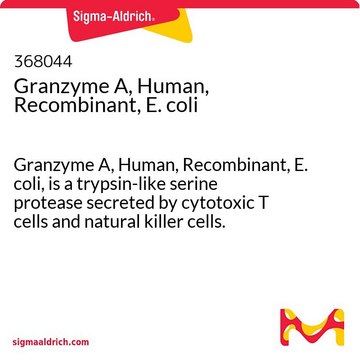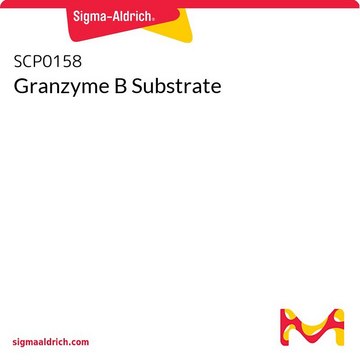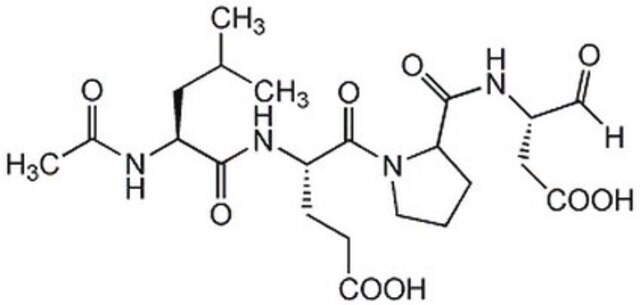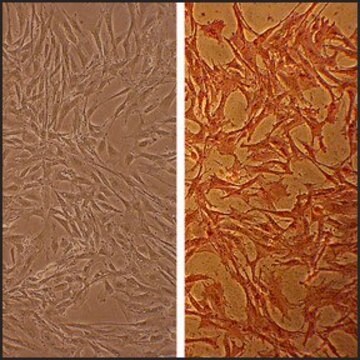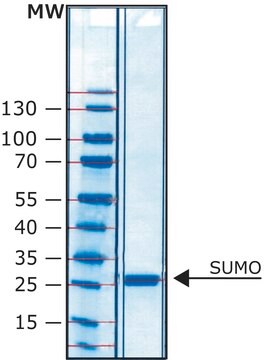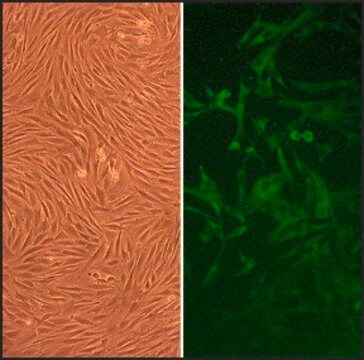SRP3202
Granzyme B from mouse
recombinant, expressed in Hi-5 Insect cells, ≥97% (SDS-PAGE), ≥97% (HPLC), suitable for cell culture
Sign Into View Organizational & Contract Pricing
All Photos(1)
About This Item
UNSPSC Code:
12352200
NACRES:
NA.32
Recommended Products
biological source
mouse
recombinant
expressed in Hi-5 Insect cells
Assay
≥97% (HPLC)
≥97% (SDS-PAGE)
form
lyophilized
mol wt
28.9 kDa
packaging
pkg of 10 μg
technique(s)
cell culture | mammalian: suitable
impurities
<0.1 EU/μg endotoxin, tested
color
white to off-white
UniProt accession no.
shipped in
wet ice
storage temp.
−20°C
Gene Information
mouse ... GZMB(14939)
General description
Granzyme B is a cysteine protease found in the cytoplasmic granules of cytolytic T lymphocytes (CTL) and natural killer (NK) cells. Granzyme B is required for the induction of target cell lysis, which occurs as part of cell mediated immune responses, and can activate apoptosis in target cells by both caspase dependent and caspase independent mechanisms. Proteolytic cleavage of substrates by Granzyme B takes place primarily after aspartic acid residues. Recombinant murine Granzyme B is a glycosylated 227 amino acid protein, comprising the mature active portion of the murine Granzyme B precursor. The apparent molecular weight is 28.9 kDa by mass spectrometry.
Biochem/physiol Actions
Granzyme B is a cysteine protease found in the cytoplasmic granules of cytolytic T lymphocytes (CTL) and natural killer (NK) cells. Granzyme B is required for the induction of target cell lysis, which occurs as part of cell mediated immune responses, and can activate apoptosis in target cells by both caspase dependent and caspase independent mechanisms. Proteolytic cleavage of substrates by Granzyme B takes place primarily after aspartic acid residues. Recombinant murine Granzyme B is a glycosylated 227 amino acid protein, comprising the mature active portion of the murine Granzyme B precursor. The apparent molecular weight is 28.9 kDa by mass spectrometry.
Sequence
IIGGHEVKPH SRPYMALLSI KDQQPEAICG GFLIREDFVL TAAHCEGSII NVTLGAHNIK EQEKTQQVIP MVKCIPHPDY NPKTFSNDIM LLKLKSKAKR TRAVRPLNLP RRNVNVKPGD VCYVAGWGRM APMGKYSNTL QEVELTVQKD RECESYFKNR YNKTNQICAG DPKTKRASFR GDSGGPLVCK KVAAGIVSYG YKDGSPPRAF TKVSSFLSWI KKTMKSS
Physical form
Lyophilized from 1x PBS.
Reconstitution
Centrifuge the vial prior to opening. Reconstitute in water to a concentration of 0.1-1.0 mg/ml. Do not vortex. This solution can be stored at 2-8°C for up to 1 week. For extended storage, it is recommended to further dilute in a buffer containing a carrier protein (example 0.1% BSA) and store in working aliquots at -20°C to -80°C.
Storage Class Code
11 - Combustible Solids
WGK
WGK 3
Flash Point(F)
Not applicable
Flash Point(C)
Not applicable
Certificates of Analysis (COA)
Search for Certificates of Analysis (COA) by entering the products Lot/Batch Number. Lot and Batch Numbers can be found on a product’s label following the words ‘Lot’ or ‘Batch’.
Already Own This Product?
Find documentation for the products that you have recently purchased in the Document Library.
Granzymes at a glance.
Michael Bots et al.
Journal of cell science, 119(Pt 24), 5011-5014 (2006-12-13)
Katherine M Horvath et al.
Respiratory research, 12, 102-102 (2011-08-06)
Modified function of immune cells in nasal secretions may play a role in the enhanced susceptibility to respiratory viruses that is seen in smokers. Innate immune cells in nasal secretions have largely been characterized by cellular differentials using morphologic criteria
Inka Albrecht et al.
The Journal of clinical investigation, 125(12), 4612-4624 (2015-11-10)
Mutations of the gene encoding four-and-a-half LIM domain 1 (FHL1) are the causative factor of several X-linked hereditary myopathies that are collectively termed FHL1-related myopathies. These disorders are characterized by severe muscle dysfunction and damage. Here, we have shown that
Our team of scientists has experience in all areas of research including Life Science, Material Science, Chemical Synthesis, Chromatography, Analytical and many others.
Contact Technical Service

